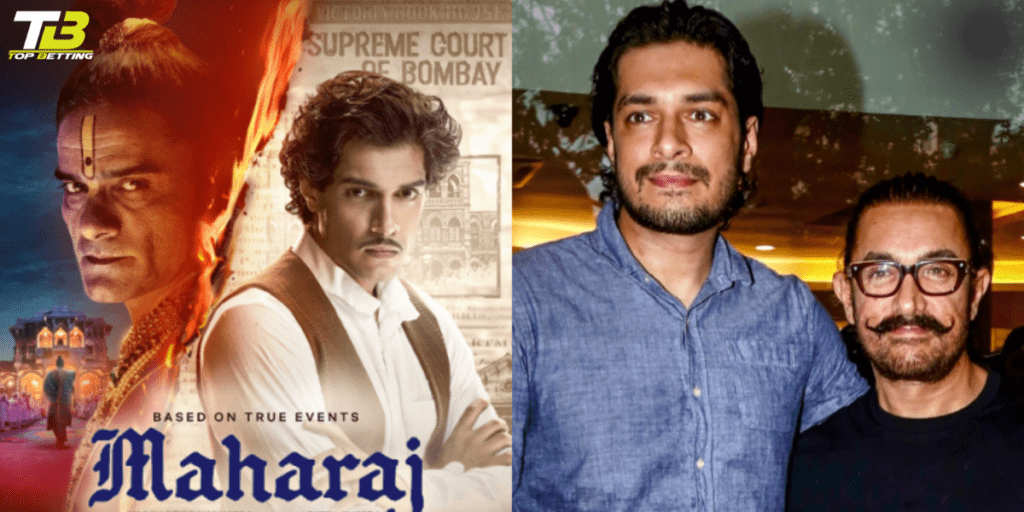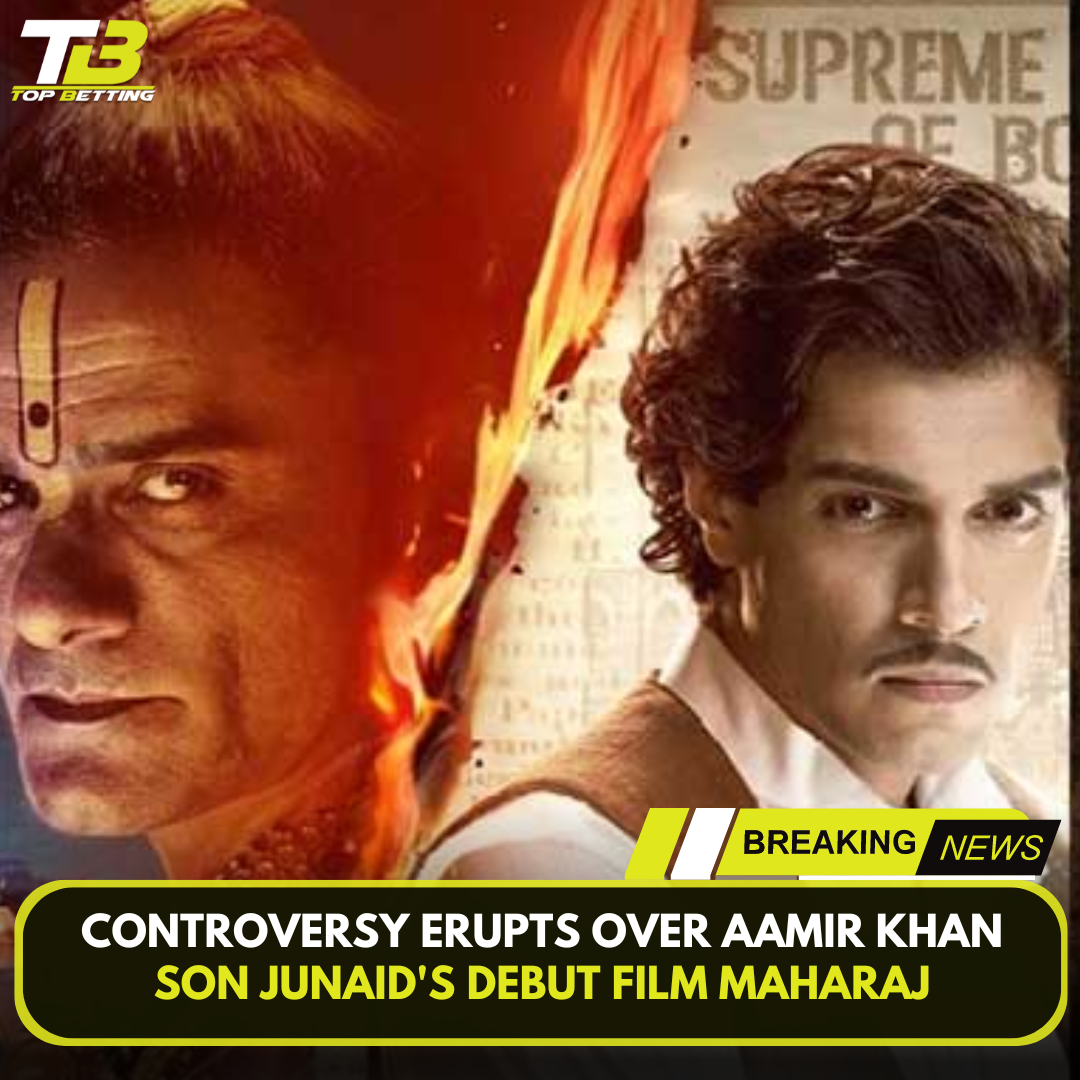
Erupts Over Aamir Khan Son Junaid Debut Film Maharaj
In a surprising turn of events, the highly anticipated debut film of Aamir Khan’s son Junaid Khan, titled “Maharaj,” has found itself at the center of a heated controversy. The Gujarat High Court has recently stayed the release of the film following a plea filed by a Hindu group, citing concerns over potential incitement of violence and hurt to religious sentiments.
The film, directed by Siddharth P Malhotra, delves into the historical Maharaj Libel Case of 1862, a landmark legal battle that garnered widespread attention and scrutiny at the time. However, the petition filed by the Hindu group claims that the film makes “seriously blasphemous comments against Lord Krishna” and could potentially cause disruption to public order.
As the legal battle unfolds, the fate of “Maharaj” hangs in the balance, leaving both the filmmakers and the audience eagerly awaiting the outcome. In this comprehensive article, we will explore the intricate details of the controversy, the concerns raised by the Hindu group, and the potential implications for the film’s future.
The Rise of Junaid Khan: Aamir Khan’s Eldest Son Makes His Debut
Junaid Khan, the eldest son of acclaimed Bollywood actor Aamir Khan, is set to make his debut in the film industry with “Maharaj.” The film, which also stars veteran actor Jaideep Ahlawat, has been eagerly anticipated by fans and industry insiders alike, as it marks the introduction of a new talent to the silver screen.
Junaid’s journey to the big screen has been marked by years of hard work and dedication. Having honed his craft in various workshops and training programs, the young actor is poised to showcase his talent and potential in this historical drama. The film’s premise, which delves into the Maharaj Libel Case of 1862, promises to provide a thought-provoking and engaging narrative for audiences.
The Maharaj Libel Case: A Landmark Legal Battle
The Maharaj Libel Case of 1862 was a significant legal battle that took place in India during the colonial era. The case centered around allegations of misconduct by a prominent figure, which sparked widespread attention and scrutiny. At the heart of the controversy was the role of Karsandas Mulji, a journalist and social reformer who had written extensively on the issue.
The case, which was tried by English judges in the Supreme Court of Bombay, touched upon sensitive religious and social issues of the time. It is this historical narrative that forms the basis for the film “Maharaj,” as it seeks to shed light on one of the most important legal battles of the era.
The Controversy Surrounding “Maharaj”
The controversy surrounding the film “Maharaj” has been ignited by a petition filed by a Hindu group in the Gujarat High Court. The group, which claims to be devotees of Lord Krishna and followers of the Vallabhacharya sect, has alleged that the film could potentially incite violence and cause serious hurt to their religious sentiments.
The petition specifically points out that the film makes “seriously blasphemous comments against Lord Krishna” and that it could disrupt public order. The group has also raised concerns about the limited promotional materials available for the film, which they believe could further exacerbate the issue.
The Gujarat High Court’s Intervention
In response to the petition filed by the Hindu group, the Gujarat High Court has issued an interim stay on the release of “Maharaj.” Justice Sangeeta Vishen, who presided over the case, has scheduled a hearing on the matter for June 18th, allowing both sides to present their arguments and evidence.
The stay order has effectively halted the release of the film, leaving the filmmakers and the audience in a state of uncertainty. The decision has sparked a wider debate on the delicate balance between artistic expression and the protection of religious sentiments.
Potential Implications and the Road Ahead
The controversy surrounding “Maharaj” raises important questions about the role of the judiciary in regulating the content of artistic works. While the concerns raised by the Hindu group regarding potential incitement of violence and hurt to religious sentiments are valid, the decision to stay the release of the film has also raised concerns about the freedom of expression and the creative process.
As the legal battle continues, the fate of “Maharaj” remains uncertain. The outcome of the June 18th hearing will be crucial in determining the future of the film and its impact on the broader discourse surrounding the intersection of art, religion, and social sensitivities.
Exploring the Film’s Premise: A Closer Look
The film “Maharaj” is based on the historical Libel Case of 1862, which was a landmark legal battle that garnered significant attention and scrutiny at the time. The case involved allegations of misconduct by a prominent figure, which sparked a heated debate and controversy.
According to the synopsis provided by the streaming platform, the film delves into the story of Karsandas Mulji, a journalist and social reformer who was a pioneering advocate for women’s rights and social reform. Mulji, a student at Elphinstone College in Mumbai and a protégé of the scholar-leader Dadabhai Naoroji, wrote extensively on issues such as widow remarriage and stood up for the oppressed.
The Libel Case of 1862 was a culmination of Mulji’s efforts, as he took a courageous stand in a landmark legal battle that set the stage for what many consider to be one of the most significant legal battles of all time.
The Significance of the Maharaj Libel Case
The Maharaj Libel Case of 1862 was a pivotal moment in India’s history, as it not only addressed the allegations of misconduct but also touched upon sensitive religious and social issues of the time. The case, which was tried by English judges in the Supreme Court of Bombay, shed light on the complex interplay between religion, social reform, and the legal system.
The case’s significance lies in its ability to ignite discussions and debates around important societal issues, such as the rights of women and the treatment of the oppressed. The fact that it has inspired a film like “Maharaj” more than 160 years later underscores the enduring impact and relevance of this historical event.
The Filmmakers’ Perspective
The filmmakers behind “Maharaj” have remained relatively tight-lipped about the controversy surrounding the film. However, in the limited information available, they have expressed their commitment to presenting a balanced and nuanced portrayal of the Maharaj Libel Case.
Siddharth P Malhotra, the director of the film, has stated that the project aims to shed light on a significant moment in India’s history, one that has long been overshadowed by the more prominent events of the time. The filmmakers have emphasized their desire to engage in a thoughtful and respectful exploration of the complex issues at the heart of the case.
The Audience’s Reaction and Concerns
The controversy surrounding “Maharaj” has sparked a wide range of reactions and concerns from the audience. On one hand, many are eager to witness the debut of Aamir Khan’s son Junaid and to learn more about the historical significance of the Maharaj Libel Case. However, the allegations made by the Hindu group have also raised concerns about the potential impact of the film on religious sentiments and social harmony.
Some audience members have expressed their support for the filmmakers, arguing that artistic expression should be protected and that the film’s portrayal of the historical events should be judged on its own merits. Others, however, have voiced their apprehension about the film’s content and its potential to incite violence or cause offense.

The Ongoing Legal Battle and the Way Forward
As the legal battle over the release of “Maharaj” continues, all eyes are on the Gujarat High Court and the outcome of the June 18th hearing. The decision of the court will not only determine the fate of the film but also set a precedent for the delicate balance between artistic expression and the protection of religious sentiments.
Regardless of the final verdict, the controversy surrounding “Maharaj” highlights the need for a nuanced and inclusive approach to addressing such sensitive issues. It is crucial that the filmmakers, the Hindu group, and the judiciary work together to find a resolution that respects the concerns of all parties while preserving the fundamental rights of artistic expression and freedom of speech.
The road ahead may be challenging, but the resolution of this controversy has the potential to set an important precedent and pave the way for a more constructive dialogue on the intersection of art, religion, and social responsibility.










